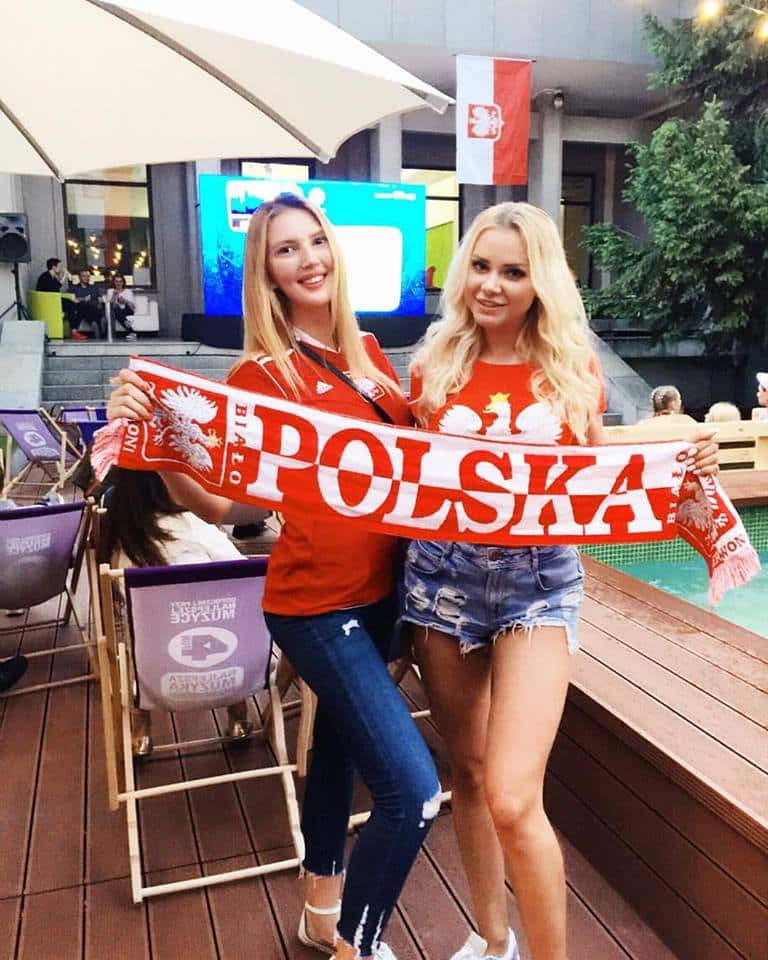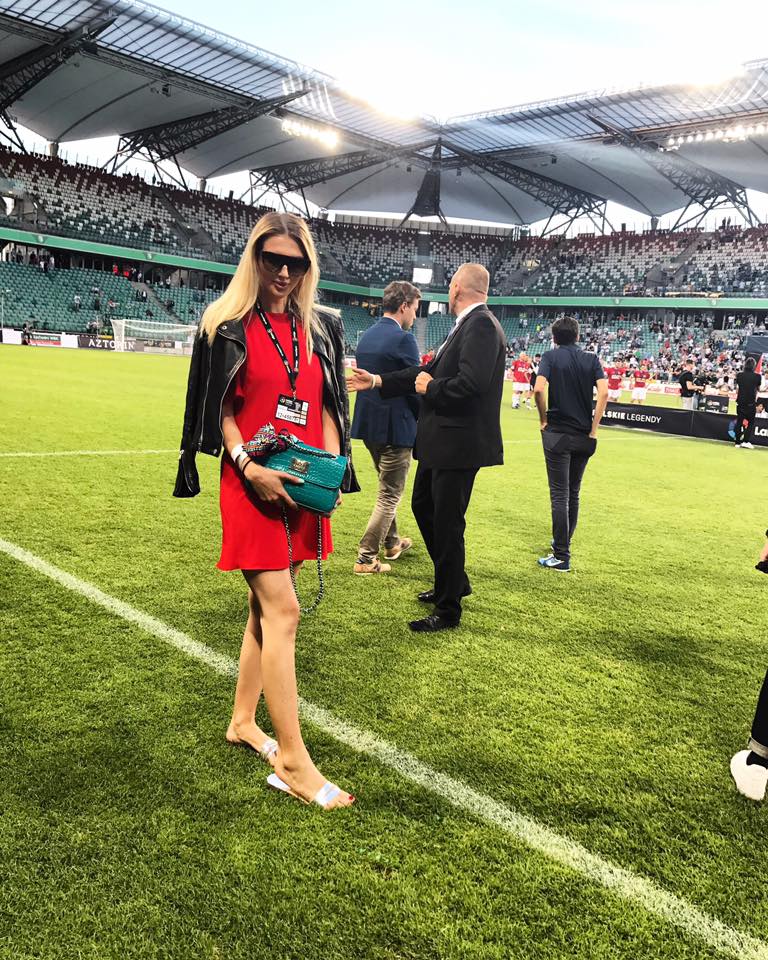Sonia Ścibor is an emerging star in the Sport Management field. But Sonia is unique from others we’ve featured so far. First, Sonia is the epitome of a global sport professional. She’s traveled across the globe, to some of the biggest and best international sporting events to gain knowledge in many areas of the sport industry. Second, she’s our very first professional working in the growing area of sport data analytics. Third, we’ve been following Sonia since she started her journey in sport as a first-year student in university! In fact, we’ve known Sonia for 8 years have seen her grow into her new role as Data Analyst for GlobalSportsJobs. Having said all that, we’re so excited to share our conversation with the budding global Sport Data Analyst that is Sonia Ścibor.

Tell us what you do as a Sport Data Analyst?
I am currently working as a Data Analyst for Global Sports in London and finishing my masters degree in Sport Analytics and Technologies. Global Sports is a leading provider of a Digital Platform for jobs and careers. They work with many of the leading sporting organizations such as FIFA, UEFA, IOC, FA, AFC and have operations in the United Kingdom, France, Germany and China. They are now expanding their proposition from the foundation of the Digital Platform into the Enterprise Data Analytics and Artificial Intelligence.

We also focus on the People Agenda in the next generation of Sport Business, Sport Business 2.0. The people’s agenda is our lingo for finding, recruiting and keeping talent (sport professionals) to sport organizations.
What does a typical day at work look like for you as a Sport Data Analyst?
The day starts with a coffee (an essential for working in analytics). Everyday looks somehow different, as everyday both internal and external audiences will have different requests. In sports recruitment, recruiters will ask for stats on their job positing, while for our internal research purposes I will analyze job seekers’ profiles to find any trends and patterns on people’s careers in the sport business.
You decided to change focus from working in the area of sport media relations to sport analytics. Talk to us about the switch.
I finished my undergraduate program in Sport Management in 2015. The school I went to for it was in the United Kingdom. Then, I went back to where I grew up in Poland to work in pay TV in rights acquisition. I worked with several sport channels such as Eurosport and Eleven Sports and was in charge of negotiating licensing rights. I however noticed, right on time I must admit, that the future is in new technologies and data analytics. The content industry, especially in terms of linear TV, is becoming particularly tough, people are turning from TVs to VOD services.
For everything, matter of fact the only thing that is keeping linear TV alive, is sport because people would still turn on their TVs to watch live games. Series and films are now available anytime anywhere.
What inspired you to get into the field of Sport Management? And what motivates you to be a Sport Data Analyst?
I am Polish and grew up surrounded by men. So football (or soccer as you’d call it in North America) it was. I was kind of forced to play when the numbers in the teams didn’t add up. I competed in swimming as a young girl as well.

There’s was this point in my life where I realized I will never be a professional athlete but I knew I wanted to stay in the sports environment so I started to look for ways. Back in high school, there was this ‘alumni day’, where former students would come to tell us about the paths they took after finishing school and one girl mentioned she is studying Sport Management. At the time, I didn’t even know such degree exists but I started doing my research and three years later, I was already pursuing my undergraduate degree in Sport Management.
Now in terms of being a sports fan, I am stoked that my interview today coincides with the start of the FIFA Women’s World Cup. I can’t wait to see which countries end up making it to the bitter end. Might as well go on to tell you who I am hoping to finish in the top 5. Are you ready [laughs]? For my top 4, I’m rooting for England, Holland, Spain, and an underdog like Thailand. Ready for number 5? I will say it… Canada! It’d be nice to see Canada finish in the top 5 at least and perhaps win it all!

I think that once you get into sport business, you start seeing athletes and events from a different point of view, what they call “professional bias”. I now watch sport events and think ,“OMG, someone is getting a promotion for singing such sponsorship deal” or I look at stats and think, “What kind of algorithms are they using?”. Besides, let’s not mix pleasure with business. Imagine you are a passionate supporter of Arsenal and a sport business student. You graduate, and you receive a job offer from Chelsea. You turn it down?
It’d be interesting to hear what software and business tools you use most as a Sport Data Analyst. Could you tell us about some of them?
My life revolves around business tools! I love that question for that reason.
1Microsoft Excel
As a Sport Data Analyst, I have to mention the despised Excel. When your in school learning about it, a lot of Sport Management students think it’ll never be used. But it’s for storing almost all the data we house as Sport Data Analysts.
2Power BI
Power BI is a data visualization tool. So it’s a business analytics service by Microsoft. I use for data visualization. That means I get to see all the stats that I work through visually. This tool helps us to create reports that are really easy to read.
3SPSS
It used to stand for Statistical Package for the Social Sciences before it was bought by IBM in 2009. The reason I mention this is because that’s exactly what it does. I use SPSS regularly for data mining and text analytics. It helps us to uncover patterns in data easily. Data mining can only go so far with machines doing the work. We as sport data analysts have to interpret the data. This tool helps make our jobs easier in the process of finding patterns in data.
4Trello
I also use Trello, to keep track of my progress at work. Trello is a really easy to use tool that helps you to keep track of who’s doing what. It’s a really detailed to-do list that a number of people can use. Once they are done certain tasks, Trello makes it easy to do a check off. It keeps us all balanced and ensuring that we are all on the same page.
5Slack
I think my favorite one is Slack, a team collaboration tool, a bit of a business WhatsApp, which I use for my work with .Lityk, a business run by a former IBM Executive with whom I am now working on the development of analytical models for diversity and inclusion in Sport Business.
What would you pinpoint as the hardest part of working in sport generally and as a Sport Data Analyst specifically?
Well, I think there hasn’t been a “hardest part”, it is an ongoing process of what I like to call “sine cosine” and if you remember some trigonometry, it is a metaphor for ups and downs.

first of all, and I won’t surprise you here, it is a very competitive and hermetic industry. It is obvious that not only people holding a sport business degree will apply for positions in sports companies – the sports industry is the “sexiest” industry by far. And yes, sending your CV out as a sports graduate and then being “ghosted” by sport companies is hard. But once you are “in” you constantly have to prove you “deserve” being there because just as you know that many people would like to be in your place, so do the recruiters.
What would you tell young sport professionals from North America about working in sport within Europe?
Well first of all, we know and admit that the North American sports industry is well ahead of the one in Europe (think of the analytics in the NBA) and if we want to develop we have to ‘copy’ North America. European sport companies are looking for individuals who have experience in the American sports industry and can share their know-how. Of course it is also the matter of personal interest considering the differences in sports popularity in North America – you will surely find less opportunities in hockey in the United Kingdom than you will in Canada.
But if there’s any advice I can give, taking the continent of out the equation, it is to remember that sport companies work like any other business. Many people pursuing their degrees in Sport Management believe that their emotional engagement with sport is enough to succeed. While yes, sport is part of the wider entertainment industry, the day to day operations in the office run just as they would do in a bank. It is important for young graduates to understand that an interest in sport is not enough to succeed in the industry. You will have to be proficient with using Microsoft Office, you will have to be comfortable with public speaking and you will have to understand sales techniques. There’s no escape from that, unless of course you join the team or become a coach.
Tell us who you think would be cool SPMA feature that you’ve seen grow in the sport industry.
I think it would be interesting to hear from more global sport business. I’m going to suggest that you interview the following three individuals.
1Yuekun Li
One of those that come to mind right away is Yuekun Li, studying Sport Business and Innovation. He has an incredible passion for sports, health and fitness. And he’s able to mix that passion with business. Therefore, he’s one I endorse for a feature on SPMA!
2Nao Okumura
Nao is from Japan. It’d be super interesting to get a perspective on a career in sport from him. His passion for rugby is on another level. He went to New Zealand for several months just to focus on studying rugby culture. I think he’d be super cool to hear from because he didn’t start off in sport. He was actually in Information Technology prior to venturing into the sport industry.
3Mithran Padmini
I love Mithran’s area of interest. He’s focused on analytics in cricket. His sport analytics skills are second to none. He’s a super curious guy and you can tell he’s super passionate about sport. Even more interesting is how much he likes to crunch numbers and talk about stats! I think your readers would find his journey in sport fascinating.
Sonia Ścibor
Interview by SPMA
Posted June 7, 2019 in Industry Profiles





